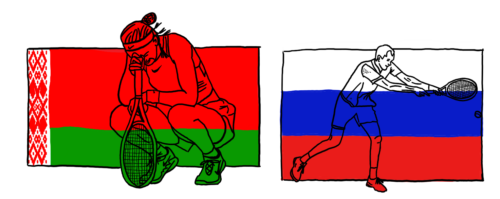Jonah: For the second straight year at the US Open Tennis Championships, neither Russian nor Belarusian players were permitted to play under their flags. Instead of the typical tiny flag pictured next to players’ names on the screen, competitors from the two countries were given a blank gray box. Both finals featured Russian or Belarusian players—Russia’s Daniil Medvedev in the men’s championship and Belarus’s Aryna Sabalenka in the women’s—unable to represent their countries. The decision by the Association of Tennis Professionals (ATP) and Women’s Tennis Association (WTA) in response to the Russian invasion of Ukraine raises the questions: can we separate athletes from the countries they hail from? And how do we decide which flags to display, and which flags to censor?
Luke: I think that the ATP, WTA, and US Open should not have the right to block out Russian players’ flags and the countries that are allied to them. War and territorial disputes are not unique to Russia, and only recognizing certain conflicts diminishes the relevance and importance of others. The Russian invasion of Ukraine in 2022 received an exceptional international response, including heightened sanctions against Russia, military assistance from the US, and support for the Ukrainian government. But this international affair does not discount other ongoing geopolitical conflicts, such as the war in the Middle East and North-West Africa. In censoring Russian athletes, the WTA and ATP—which are both headquartered in London—have not only started to take a stance that backs Western ideology, but also posits the Russian-Ukrainian war as more pressing than any other global conflict.
Jonah: I wouldn’t accuse ATP and WTA with the same trajectory as the US Open administration. While the ATP and WTA have taken a concrete stance against Russia, they have not forced any athletes to support Ukraine over social media or at any fundraising events. While they’ve historically remained impartial to other global conflicts, they draw the line with countries who have invaded and attempted to annex others.
Luke: Your bias towards invasions disregards the death toll that other wars often yield. Over 4.5 million people have died in Iraq, Afghanistan, Yemen, Syria, and Pakistan from post-9/11 wars. Yet no one has called for the United States Flag to be grayed out. Saudi Arabia and the UAE have been commiting mass genocide in Yemen since 2015, yet players from those nations are still allowed to compete under the flag of their countries. I think that if the ATP and WTA are going to not let players support their flag because of violence, then they should hold all countries who commit violence accountable.
Jonah: While I agree that the actions of these countries are terrible, I don’t believe that we can effectively hold all countries accountable for each and every act of violence that they commit. If we start holding all athletes from war-stricken countries accountable, we will strip national pride from all sporting events. What about the allies of these countries? What about refugees? It seems like a very difficult line to draw and one that would leave a large proportion of athletes flagless.
Luke: I think that athletes and people alike should be able to separate the actions of the military and diplomats from their nationality. I personally do not support the American involvement in Afghanistan, Iraq, and Iran during the past couple of decades, but I would still feel prideful to play under the American flag. American military decisions and geopolitical involvement should not define our athletic careers, and the same logic should be applied to players from Russia and Belarus as well as any other county at war.
25-year-old Belarusian tennis player Aryna Sabalenka has been forthright about not supporting the war in Ukraine as well as the current agenda and decisions of the current President of Belarus. Yet in stating her political views, she also recognizes that she is not a politician, but a tennis player, and should therefore be treated with respect regardless of where she is from. Sabalenka pulled out of two press conferences this year, explaining to reporters, “I felt really disrespected, and I felt really bad… I just tried to focus on myself, on my game.” I think that the ATP association also places far too much pressure on Russian and Belarusian athletes, constantly ridiculing them and calling them out over something that they cannot control.
Jonah: A country’s flag is more than just a decoration—it symbolizes a country’s history, actions, and global presence. People might not (and often don’t) support every political advancement or decision that their country makes, yet some actions (like invading another country and claiming sovereignty over it) are difficult to overlook. And while players’ actions against their Russian and Belarusian peers are inexcusable, they are separate from the actions of the ATP and WTA. The alternative—ignoring a global war and pretending that everything is okay—might have garnered a worse response. Athletes might have been treated poorly and the silence could have made its own political statement.
Luke Wagner ‘26 (lukewagner@college.harvard.edu) and Jonah Karafiol ‘26 (jonahkarafiol@college.harvard.edu) write Forum for the Harvard Independent.

